Hearthstone's Year of the Dragon ushers in some huge Hall of Fame picks, a card back randomizer, and much more
Baku and Genn are officially getting benched
It's always a special feeling when Hearthstone is entering a new year, as multiple old sets rotate out of the Standard format to completely upheave the meta. It's also a chance for Blizzard to tease players for what to expect from the coming expansions, and give the community some wish-fulfillment with the introduction of fresh features. But Hearthstone's Year of the Dragon is pulling out all the stops when it kicks off with the release of 2019's first set in April. And chief among the changes is the Hall of Fame lineup that includes Legendary staples Baku the Mooneater and Genn Greymane, two minions that threatened to completely warp the Standard format. As the Year of the Raven comes to a close, with cards from the Journey to Un'goro, Knights of the Frozen Throne, and Kobolds & Catacombs sets all leaving Standard, here are all the need-to-know changes that are coming when the Year of the Dragon takes flight.
New Hall of Fame inductees will remove odd/even decks and some key class cards from Standard
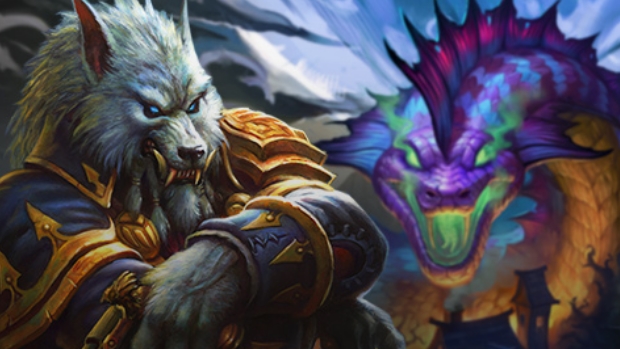
If you're not familiar with the Hall of Fame, it's a way for Blizzard to remove cards from the Standard format and restrict them to the all-encompassing Wild format as a means of tuning up the meta. At the moment, the Standard format has felt a bit stale due to the prevalence of decks built around Baku the Mooneater and Genn Greymane, minions who improve your hero power by making it more powerful (Baku) or cheaper (Genn) if you built your deck using only odd- or even-cost cards, respectively. It was a refreshing concept when the Year of the Raven started with The Witchwood expansion, but after a year of seeing the same powerful decks built around these Legendary cards, the thought of seeing them for another year before rotation seemed dreadful.
Fortunately, Blizzard is making an unprecedented move by putting cards from an expansion set into the Hall of Fame for the first time ever, effectively removing Baku and Genn from Standard a year early. By that same token, minions that complemented the odd/even mechanic - Black Cat, Murkspark Eel, Glitter Moth, and Gloom Stag - are also being sent to the Hall of Fame. As someone who follows Hearthstone's Standard format closely, I'm thrilled that Baku and Genn are getting benched - they skewed the format a little too much, seemingly restricting designs for future cards lest they become too powerful in odd or even decks. With those two gone, we should see a lot more refreshing deck variety, especially for certain classes; I'd be fine to never see another Odd Paladin, Odd Rogue, or Odd Warrior match for the rest of my days. Heck, when both Odd Paladin and Even Paladin decks were prominent archetypes for months on end, it's clear there's a problem.
"I think there was a general admission that [Baku and Genn] did what they set out to do, which was change the meta in a way that made it very interesting," said creative director Ben Thompson during an interview. "We decided that it was time to break precedence and remove [them] a year earlier, because we feel that it is the right thing now for the meta... the year looking forward didn't look like a year that was going to feel as good, knowing that they were still there to contend with during that time. And frankly, it just opens up a lot more interesting design space, particularly as we're headed into this year."
But the Hall of Fame inductees don't end there: three class-specific cards are also getting the boot. The pick with arguably the biggest impact is Naturalize, Druid's hard removal spell that usually managed to turn the drawback of giving the opponent two cards into a fatigue-inducing advantage. Without Naturalize, Druid decks will have a much harder time dealing with big minions, and won't have one of their most precious tools for setting up combos like Hadronox or King Togwaggle (though those cards will naturally rotate out of Standard in the Year of the Dragon). Warlocks are losing Doomguard, the beefy charge minion that was frequently cheated into play by Possessed Lackey or Skull of the Man'ari, eliminating the drawback of having to discard two cards. And Paladins will no longer have access to absurd card draw as Divine Favor enters the Hall of Fame, so control players won't feel punished when an opposing Paladin dumps their hand full of cheap minions and spells before instantly reloading for overwhelming card advantage. As always, you'll get to keep any previously collected cards going into the Hall of Fame, and you'll be awarded their full dust value so as not to deprive your collection of value.
The three expansion sets in 2019 are part of one big trilogy
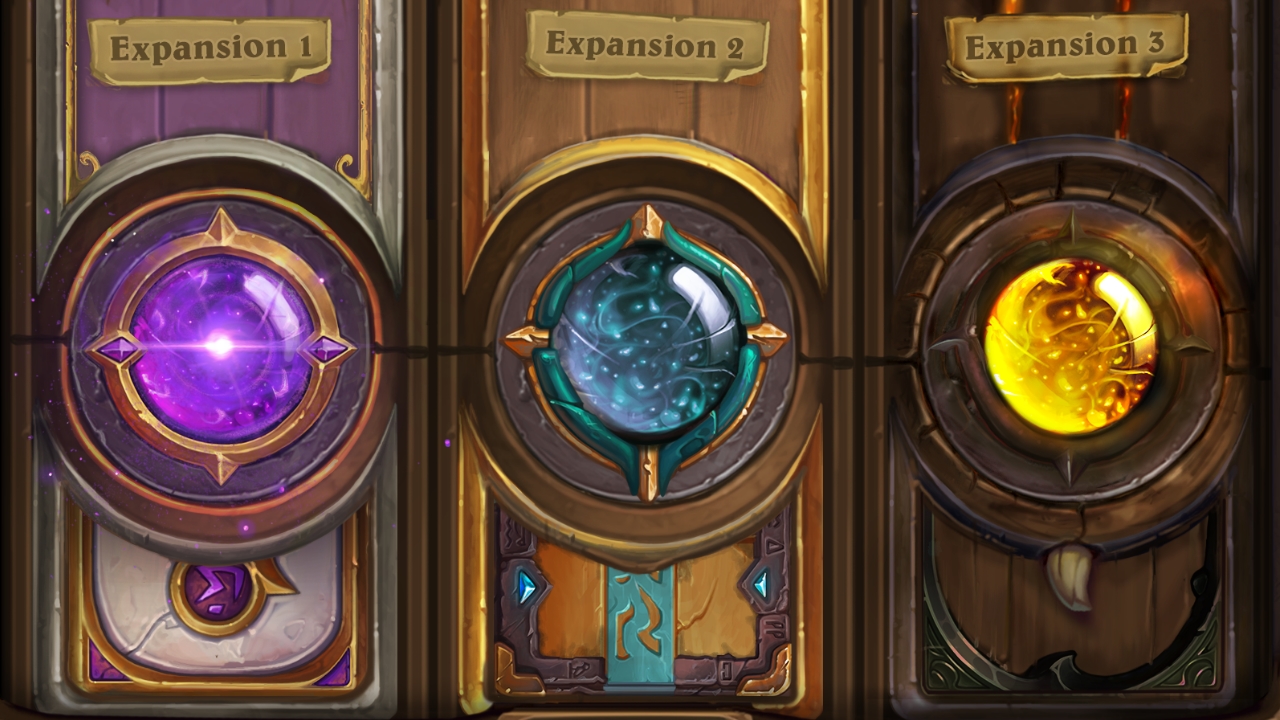
Hearthstone has kept a consistent schedule of three expansions in each calendar year, and the Year of the Dragon is no exception - but there's a fun change this time around. All three expansions are part of a larger, overarching story, like three acts of an epic plot. Getting to watch the story unfold over the course of the year should help build up a lot of hype, as the three sets won't feel like disconnected, self-contained one-offs that have no direct implications on the upcoming sets.
The first expansion will also bring about one of the biggest Solo Adventures yet, with - deep breath - nine new Henchman heroes to play as, 27 total hero powers, 36 possible starting decks, 75 bosses in total, Heroic and Anomaly modes, and Friendly Encounters (inspired by the unconventional boards of The Boomsday Project's Puzzle Labs). A new Legendary card called Zayle, Shadow Cloak is being added that functions much like Whizbang the Wonderful, randomly assigning you with one of five possible themed decks. You'll also have access to much more in-depth tracking information for your past victories, as well as the ability to pause mid-game and resume exactly where you left off later, even if you're in the middle of a solo match.
Weekly digests, tales from the communities you love, and more
Everyone will get the first chapter of this new Solo Adventure for free, featuring a mage character who we've seen in previous single-player outings. From there, you'll have the option to buy each new chapter for 700 gold each, or skip the in-game currency and buy the whole thing for $19.99. Each chapter past the first gives you access to two more characters, who have three hero powers to choose from and four starting decks. You'll be rewarded with three card packs once you've completed each chapter, plus a golden card pack and a spiffy card back after you've beaten the whole campaign. I've had the chance to play this new Solo Adventure extensively - and though I can't talk about it in detail just yet, it's definitely the most fun I've had with Hearthstone PvE since the debut of Dungeon Runs in Kobolds & Catacombs.
The card back randomizer lets you flaunt your card back collection
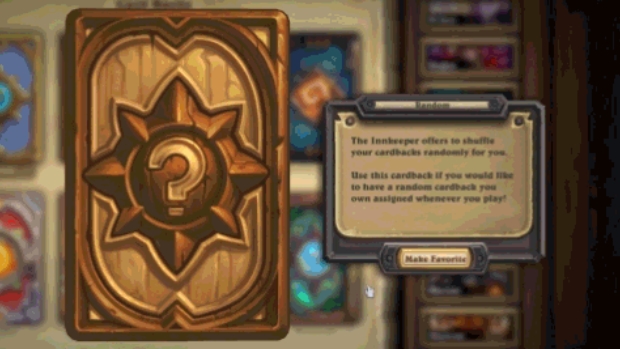
The Hearthstone community has been requesting this feature for what feels like years, so it's great to see Blizzard finally adding it to the game. A special card back will be added to your collection that, when selected, will display as one of the card backs you own when the game starts. Now you don't have to agonize over which of your precious card backs you want to show the world - simply pick the card back randomizer and let it make the decision for you. There's even a small chance that your deck will display the actual randomizer card back, so consider yourself lucky if you play a game with this uncollectible bit of flair.
Arena is getting some upgrades
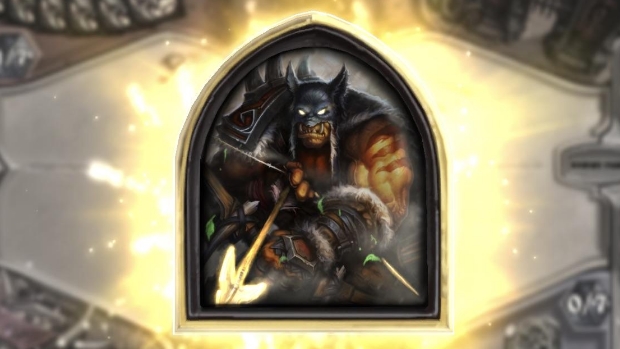
If you've been chasing after the golden hero portraits awarded for 500 wins with a certain class, your quest might get a bit easier. Starting when the Year of the Dragon goes live, wins in Arena matches will count towards that 500-win tally, so you can enjoy Arena knowing that you're contributing towards your golden long-term goal. To be honest, I assumed this was already the case, so as someone with nary a single golden hero, I'm glad to see things getting a bit more intuitive.
Arena seasons will also be more frequent going forward. Every two months - twice per expansion, in other words - Arena will get a refresh featuring a different series of expansions. That can be a mix of new and old sets, creating a format that's distinct from any given time period in Standard or Wild. These seasons will pull from around six expansions, and will always include the most recent expansion - but there should be way more variety in Arena thanks to these remixed seasons.
An improved auto-complete tool for building new decks using your collection
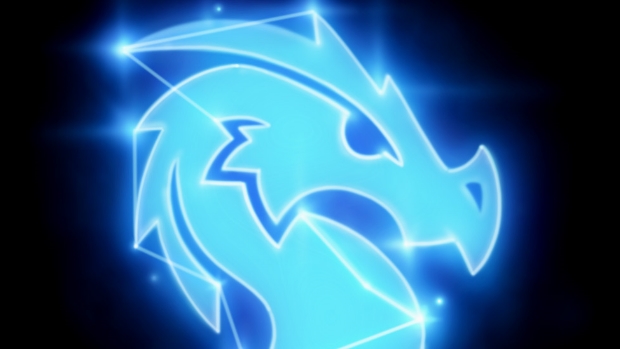
There are also some improvements being made to the auto-complete tool that fills out your deck if you've chosen less than 30 cards. Instead of needing to jump over to a wiki or deck aggregator site, the auto-complete tool will now keep track of decks that are performing well in the meta and try to match your collection up with one of those viable choices. No matter what you throw at it, the auto-complete function will do its best to construct a halfway decent deck using your favorite cards. The more inventive and unique decks appear in the meta, the more data the auto-complete tool has to pull from, which will be a huge boon for newcomers looking to jump into ladder games using whatever they've got in their collection.
That's a lot to take in, and we'll be able to tell you so much more about the first expansion and its massive Solo Adventure in the months leading up to launch. For now, though, I'm going to go throw a little party for the early retirement of Baku and Genn; it was nice knowing you and your odd/even kind.
If you're just getting started in Blizzard's ever-changing card game, here are the best Hearthstone decks for beginners.
Lucas Sullivan is the former US Managing Editor of GamesRadar+. Lucas spent seven years working for GR, starting as an Associate Editor in 2012 before climbing the ranks. He left us in 2019 to pursue a career path on the other side of the fence, joining 2K Games as a Global Content Manager. Lucas doesn't get to write about games like Borderlands and Mafia anymore, but he does get to help make and market them.



